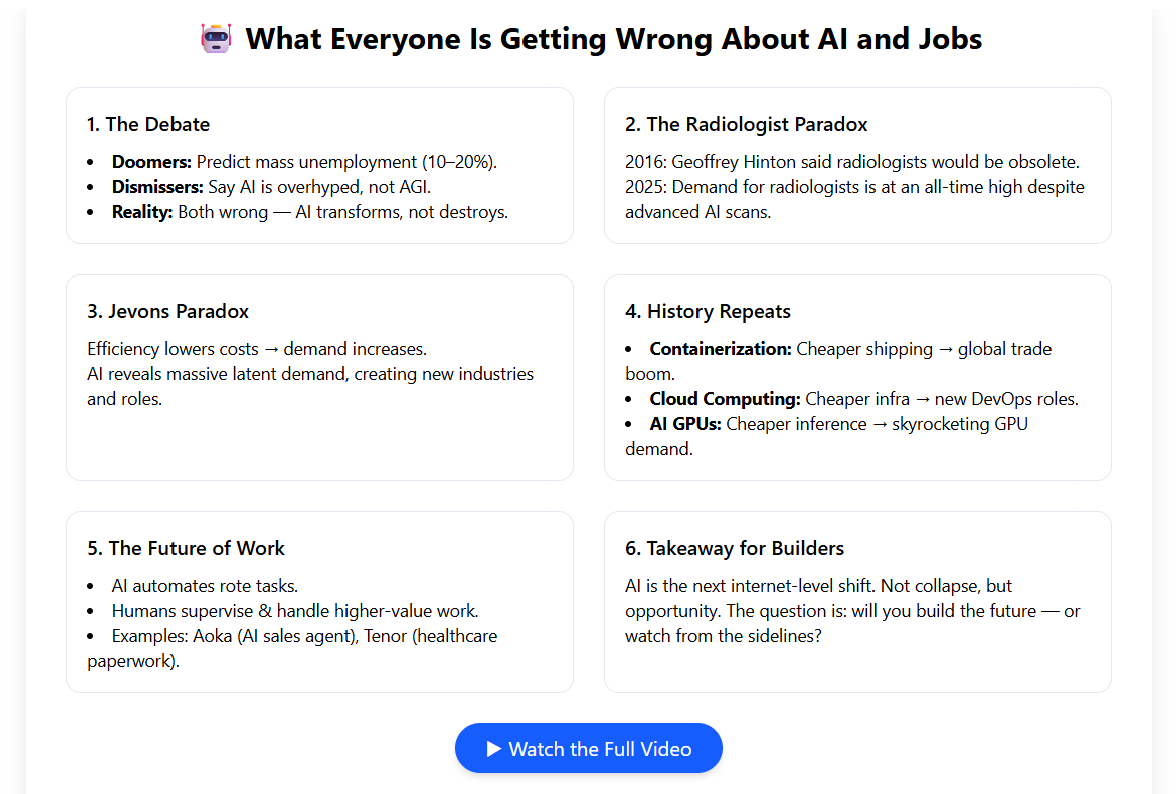- Foundevo Newsletter
- Posts
- AI Won’t Take Your Job — It Will Transform It
AI Won’t Take Your Job — It Will Transform It
AI Creates More Jobs

Will AI wipe out jobs—or create more of them?
The headlines are loud, the Twitter threads are louder, and the predictions range from apocalyptic to dismissive. On one end, the doomers claim AI will unleash universal unemployment, with 10–20% jobless rates and half of all entry-level white-collar jobs vanishing in five years. On the other end, the hype dismissers argue AI is overblown, insisting it’s not “real” Artificial General Intelligence (AGI) and won’t fundamentally transform the economy.
Both are wrong. History, industry data, and basic economics suggest something different: AI will transform the economy, but not destroy it.

The Radiologist Paradox: A Case Study in Failed Predictions
Back in 2016, Geoffrey Hinton—one of the godfathers of AI—predicted we should stop training radiologists because deep learning would replace them within five years. Fast forward a decade: the demand for radiologists is higher than ever.
This isn’t because AI failed. Quite the opposite—AI now detects and classifies hundreds of diseases with speed and accuracy. Yet instead of disappearing, radiologists are more valuable because AI made imaging cheaper and more powerful, unleashing latent demand.
The Core Mechanism: Jevons Paradox and Latent Demand
Economist William Stanley Jevons observed in the 19th century that when technology makes something cheaper and more efficient, consumption doesn’t shrink—it skyrockets.
AI is doing the same thing today. By making tasks like analyzing MRIs, drafting contracts, or writing code faster and cheaper, it doesn’t eliminate demand. It reveals massive unmet demand.
Just like:
Containerization (1960s): Cheaper shipping crushed dock jobs at first—but global trade exploded, creating billion-dollar logistics industries.
Cloud Computing (2010s): IT got 10x cheaper. Traditional admins became cloud architects and DevOps engineers, managing at new scales.
AI GPUs (2020s): Algorithmic efficiency made inference cheaper, and instead of demand dropping, GPU demand exploded—NVIDIA stock went stratospheric.
Efficiency creates more demand. That’s the paradox.
YC’s Garry Tan captures this dynamic perfectly in his video “This 19th Century Theory Explains Why AI Won’t Kill Jobs.” He explains that history and economics repeatedly show the same pattern: technology doesn’t eliminate people, it redefines what they can do. From coal engines in Jevons’ time to today’s AI systems, efficiency gains don’t shrink opportunities—they expand them, often creating entire industries that didn’t exist before.
The Future of Work: Humans Still in the Loop
Here’s the shift: AI won’t erase humans, it will refactor jobs.
Expertise becomes more valuable: AI drafts the contract, but lawyers advise on strategy. AI analyzes the scan, but radiologists decide on treatment. AI writes the code, but engineers design systems and supervise agents.
Rote work gets automated: As Andrej Karpathy puts it, AI takes on the boring, repetitive jobs first—data entry, customer service, paperwork.
Roles evolve into supervision: Instead of doing every task manually, workers will supervise fleets of AI agents. Think less “do the grunt work” and more “direct the orchestra.”
Examples already emerging:
Aoka (YC): AI sales agents free up service industry workers for higher-value conversations.
Tenor: Automates healthcare paperwork, shifting admin roles into care coordination and complex case management.
The result? Fewer frustrating, low-value tasks. More engaging, higher-level work.
Conclusion: What This Means for Builders
Yes, the AI transformation is real. No, it won’t collapse the job market or leave us all reliant on universal basic income. What’s happening is bigger: AI is the next internet-level shift.
The opportunities are massive—but only for those who see beyond the hysteria.
The question isn’t whether AI will take jobs. It’s: Will you be one of the founders, builders, or early adopters who creates the future while others get stuck in the past?
Watch the full video breakdown here and see how you can seize the AI opportunity.👇️

Reply